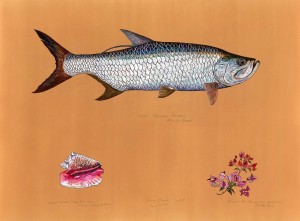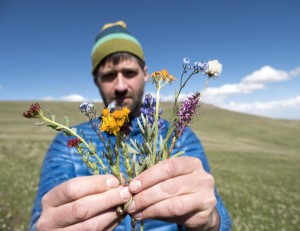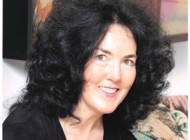Artist, writer, naturalist and Yale graduate James Prosek got hooked on trout early and made his debut as an author at 19 years of age with Trout: An Illustrated History (Alfred A. Knopf, 1996), which featured 70 of his watercolor paintings of the trout of North America. He will be honored by the American Museum of Fly Fishing on October 26 at a reception, dinner and auction at the Racquet and Tennis Club of New York City.
When did you first think about becoming a naturalist/artist?
I’ve been drawing since I could hold a pencil. My early passion was drawing birds. My father grew up in Brazil and fell in love with birds as a child there. He introduced me to nature through his love of birds. Drawing has been a consistent passion. I was introduced to fishing by a friend of mine at school when I was 9 years old. I can remember vividly one winter day when we went fishing at a little brook at the north end of the Easton Reservoir where he said he’d caught some trout. I caught my first native brook trout that day. It was the most beautiful thing I’d ever seen. I couldn’t believe that something so colorful, almost like a tropical fish, lived in these little, dark brooks near my home. I went to a local library looking for a book on the trout of North America and couldn’t find one. So I thought, well, I’ll try to put one together.
Why is the world still enthralled by The Compleat Angler philosophy of Seventeenth Century author Izaak Walton?
As an English literature major I wrote my senior thesis on Walton’s book. The Compleat Angler was published in 1653 and it was really the first book that treated angling as a recreation and not just a means of catching food. But there is more to it. Walton was an Anglican and supporter of King Charles I during the English civil war when he and his friends like the poet John Donne were being pushed out of their places of work and worship in London. He was basically saying through his fishing book, we don’t need the trappings of the city to be good Christians. We can return to nature and live a good life there in the forests and under the trees.
The book was in part code for “The Compleat Anglican.” One of his first arguments in favor of fishing was that the apostles, the first followers of Jesus on the Sea of Galilee, were fishermen. That Jesus chose fishermen to be his followers because they were humble and were in tune with their environment. The book also has some good fishing instruction, recipes, poems, songs and drawings. It is a delightful pastoral fantasy. People latch onto it, I think, because of its philosophy about living simply and in peace.
Tell us about the World Trout conservation initiative you co-founded with Patagonia’s Yvon Choiunard.

“Tarpon” by James Prosek, 2015, watercolor, gouache, acrylic, colored pencil, ink, powdered mica and graphite on tea-stained paper, 44 by 60 inches. Courtesy of James Prosek and Schwartz-Wajahat, New York.
I met Yvon Choiunard in 2002 or 2003. We were both involved with the Yellowstone Park Foundation that helps raise money for the park to supplement what the government provides the park, which is never enough. We were on a trip in the park, sitting by a campfire and he said, “I’ve been thinking about putting your work on T-shirts to raise money for conserving cold water wildernesses,” and I said, “That sounds great!” We started raising money. Through my travels, I had met people doing good conservation work on coldwater streams around the world and helped suggest individuals and groups to give money to. We would give out relatively small amounts of money, $10,000 or $20,000, to different grassroots organizations, the idea being that these small groups can get a lot done for the global cause by acting locally. I believe World Trout has given away between $750,000 to $1 million by this point. And now there are other artists contributing their work too.
Tell us about Troutband.
I play guitar and harmonica and I like writing songs. Most of what the Troutband has played over the years is original material. Troutband started with my roommate and me in our Yale dorm room. We were listening to things like the Violent Femmes and Woody Guthrie. Some of it was a bit more rocky and some of it was more folky. And then I met my friend Joe Dochtermann, who now lives in Berlin, Germany, and we’ve been playing for 20 years or so, and from there other bandmates, Dennis Hrbek and Rick Richter, joined. Joe has eclectic tastes in music from Black Sabbath to Tom Waits to The Eels, but we all love the Beatles. I’ve always liked Nirvana as well, so there are many influences we draw from. I’d like to think, however, that we have a sound that’s somewhat unique though recognizable. We’ve put together three CDs over the past 20 years and we’re working on another one. It’s really just for fun, of course, more than anything else!
Are you optimistic or pessimistic about the future of the world’s streams and aquatic habitats?
I do have optimism about the future of the planet. We can’t expect that it’s ever going to be the same. Nature is about change and some of those changes are cataclysmic. Everything we do is part of that moving and changing. Life will go on, it will proliferate, but it won’t be as we knew it before. Still, I hope we can preserve the places where creatures like trout live. They have been the sources of my awe and inspiration and I wouldn’t want to live in a world that didn’t have them.
—W.A. Demers





